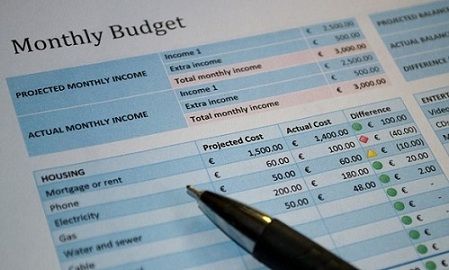 Budget implies a formal quantitative statement of income and expenditure for a certain period. It is a plan for the resources allocated for the completion of the activities, that requires to be followed, to achieve the desired end. It is not exactly same as forecast, which is a simple estimation of the future course of event or trend. It is a forward looking activition, which encompasses projection.
Budget implies a formal quantitative statement of income and expenditure for a certain period. It is a plan for the resources allocated for the completion of the activities, that requires to be followed, to achieve the desired end. It is not exactly same as forecast, which is a simple estimation of the future course of event or trend. It is a forward looking activition, which encompasses projection.
Forecast can be understood as the evaluation and interpretation of the conditions that are likely to occur in future, with respect to the operations of the enterprise.
The two terms budget and forecast, ae commonly misconstrued with each other. But there exist a fine line of differences between budget and forecast, which we’ve discussed in the given article.
Content: Budget Vs Forecast
Comparison Chart
| Basis for Comparison | Budget | Forecast |
|---|---|---|
| Meaning | A budget is a financial plan expressed in quantitative terms, prepared by the management in advance for forthcoming period. | Forecast means estimation of future trends and outcomes, based on the past and present data. |
| What is it? | It is the financial expression of a business plan or target. | It is the prediction of upcoming events or trends in business, on the basis of present business conditions. |
| Target | Budget sets target. | There are no targets. |
| Updation | Annual basis | At regular intervals |
| Estimates | What business wants to achieve | What business will achieve |
| Variance Analysis | Yes | No |
Definition of Budget
A budget is defined as a detailed financial plan for a particular accounting year. It is a written document which is expressed in monetary terms and represents all economic activities of a business organization. It is an ongoing process as it needs to be revised, adjusted, updated and monitored at regular intervals when there is a change in the prevailing conditions.
The budgets are prepared for the forthcoming period, considering various objectives of the business organization such as vision, mission, goals, objectives, and strategies. In other words, budget indicates the business plans and therefore planning should be done before budgets are prepared. It is prepared by the management of the enterprise keeping in view the past experiences. After the preparation of budgets, they are used to direct and coordinate business activities to achieve the objectives. A budget helps in the control process, i.e. actual outcome is compared with the budgeted outcome, and if there is any deviation, then necessary actions are taken to prevent unplanned expenditures.
Budgets can be classified on various basis i.e.
- Master Budget
- On the basis of capacity: Fixed Budget and flexible budget.
- On the basis of function: Sales budget, production budget, purchase budget, cash budget, etc.
- On the basis of time: Long term, short term, and current budget.
Definition of Forecast
The projection of business activities for future accounting period on the basis of historical data is known as forecast. The management does it in the light of past experiences and knowledge. Business forecasts predict the forthcoming financial inflows and their sources by evaluating current and previous data and trend analysis.
Forecasting helps the business in taking immediate actions by examining and analyzing the data provided. It also assists in budgeting and planning process. It can be done by adopting qualitative or quantitative or the combination of the two methods.
Key Differences Between Budget and Forecast
The significant differences between budget and forecast are mentioned below:
- A financial plan expressed regarding money, prepared by the management in advance for the forthcoming period, is called a budget. The forecast is an estimation of future business trends and outcomes based on historical data.
- Budget is a financial expression of a business plan, whereas forecast is a prediction of upcoming events or trends in business, on the basis of present business conditions.
- Budgets are prepared annually for every accounting period. On the other hand, the forecast is revised and frequently adjusted, i.e. at short intervals.
- In budgeting, variance analysis is done to compare actual results with the expected results. Conversely, in forecasting, variance analysis is not done.
- Budgets estimate what business plans to achieve. As opposed to the forecast, which estimates what business will achieve.
- Budgets usually set targets for the future. Unlike forecast, which only projects future outcomes but does not set any target.
Conclusion
Budget is the financial plan prepared by the business for its future economic activities. On the other hand, the forecast is just a prediction about future inflows and outflows of the business organization. Both of these are financial planning tools that assist the senior management of the organization in the decision-making process.






shah says
i want to learn budget and forecasting and all other accounting closing entries etc….. upto finalizaton
Tam says
Explained very well here so I am interested to learn more
Kleadionangel says
very interesting.